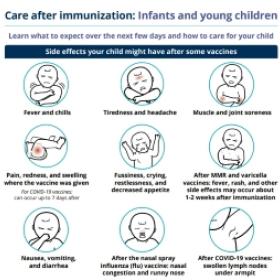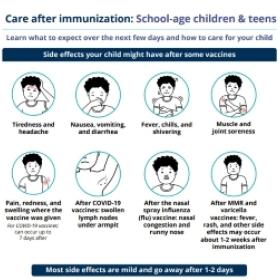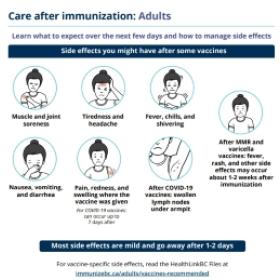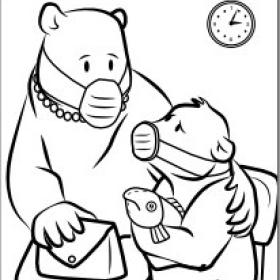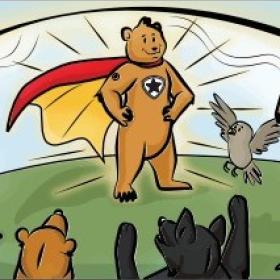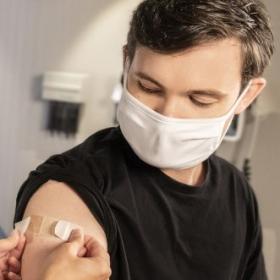Date last reviewed:
Monday, Jan 06, 2025
HealthLinkBC
Read the COVID-19 Vaccine HealthLinkBC Files
COVID-19 mRNA vaccines. Available in 简体中文 (Simplified Chinese), 繁體中文 (Traditional Chinese), یسراف (Farsi), 한국어 (Korean), ਪੰਜਾਬੀ (Punjabi), and other languages.
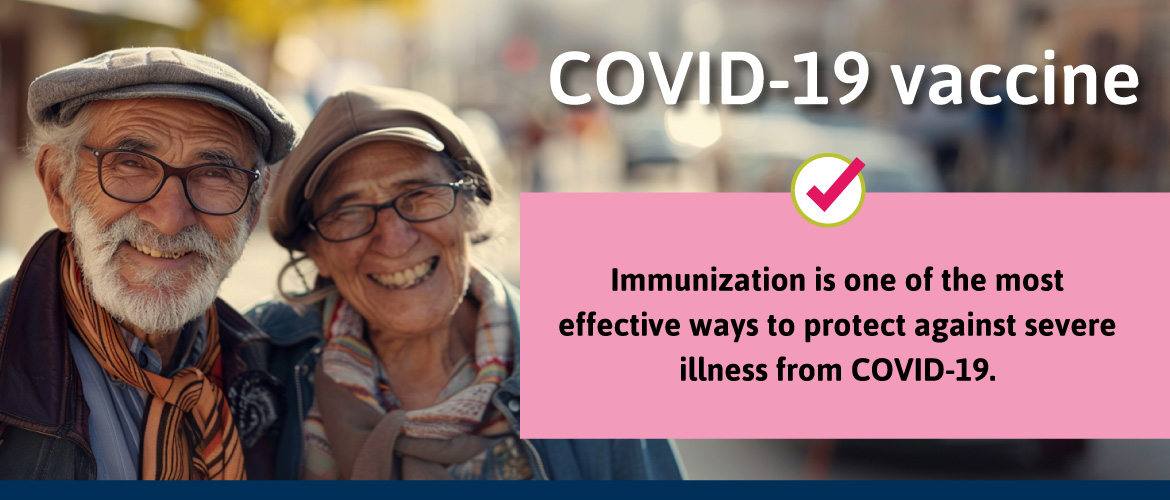
Disease it protects against
COVID-19 vaccines protect against:
- Severe illness from COVID-19.
COVID-19 is a respiratory illness caused by the SARS-CoV-2 coronavirus. Symptoms of COVID-19 are similar to other respiratory illnesses, including the flu and the common cold. Most people who get COVID-19 will experience mild to moderate illness, but some people become severely ill. Learn more about COVID-19.
Your COVID-19 vaccine
Everyone 6 months of age and older can get the COVID-19 vaccine. Immunization is one of the most effective ways to protect against severe illness from COVID-19.
- Fall 2024 immunizations
-
COVID-19 and influenza immunizations are free and available for everyone 6 months and older in BC this fall. You can get your COVID-19 and influenza immunizations at the same time.The COVID-19 vaccine available this fall has been updated to target recent variants. The updated vaccine helps maintain your level of protection against severe illness from a COVID-19 infection.It is particularly important for those at increased risk of COVID-19 infection or severe disease to get vaccinated, including:
- People 65 years of age and older
- Indigenous peoples and people residing in Indigenous communities
- Residents of long-term care homes and other congregate living settings for older adults
- Individuals with underlying medical conditions
- Individuals who are pregnant
- People who provide essential community services, including healthcare workers
You will receive a notification by text message or email when it is time to book an appointment. Starting October 8, notifications with a direct booking link will be sent out, beginning with priority populations and then to everyone else registered in the Get Vaccinated System until early November.If this is the first time getting vaccinated against COVID-19, you will need to register with the Get Vaccinated system. You can call 1-833-838-2323 if you have questions.BC’s vaccination campaign is based on the latest recommendations from the National Advisory Committee on Immunization (NACI). - How to book an appointment to get vaccinated
-
You will receive a notification by text message or email when it is time to book an appointment. Starting October 8, notifications with a direct booking link will be sent out, beginning with priority populations and then to everyone else registered in the Get Vaccinated System until early November.Make sure you or your child are registered with the Get Vaccinated system. If you have already registered, you do not need to register again.Register
- Online: gov.bc.ca/getvaccinated, available in 12 different languages
- By phone: Call 1-833-838-2323 (toll-free), available in 140 different languages.
- In-person: At all Service BC offices. You will need to have a Personal Health Number. Find a Service BC office.
If you don't have a Personal Health Number, you need to register by phone by calling 1-833-838-2323. A Personal Health Number will be created for you.Book an appointment
You will receive a notification by email or text message to book a vaccine appointment.You can select a date and time at a community pharmacy or vaccination clinic near you. If needed, you can easily reschedule your appointment online.You can call 1-833-838-2323 if you have questions.You will receive another notification to book an appointment the next time a COVID-19 vaccine is recommended.People living in First Nations communities can contact their community health centre or nursing station to find out how to book a COVID-19 vaccine appointment. - Which vaccine will I receive?
-
COVID-19 vaccines have been updated for the 2024/25 respiratory season to better match circulating variants. The mRNA vaccines have been updated to target the KP.2 variant.A non-mRNA COVID-19 vaccine is currently not available.If you are not able to receive an mRNA COVID-19 vaccine, speak to your health care provider about other treatment options if you get COVID-19.
- How many doses?
-
Everyone 6 months and older is eligible to receive the updated KP.2 COVID-19 vaccine.Some may need additional doses depending on their age, medical conditions and vaccination history.Call 1-833-838-2323 if you are eligible and have not yet received an invitation to book an additional dose.There are printable handouts available for download about COVID-19 vaccination available for people who are considered clinically extremely vulnerable.
- Timing and previous doses
-
The National Advisory Committee on Immunization (NACI) recommends getting the updated COVID-19 mRNA vaccine at least 6 months after your last dose of COVID-19 vaccine.This interval may be shorter depending on your age, medical conditions and COVID-19 vaccination history.
- Timing of vaccination after infection
-
If you've recently had a positive COVID-19 test result, the chance of getting COVID-19 again is low in the months after infection. You can wait 6 months (minimum 3 months) for your next vaccine dose. The immune response is better when there is more time between infection and vaccination.How to know if you’ve had COVID-19:
- If you have ever had a positive COVID-19 test (PCR or rapid antigen test at home)
- If you ever had symptoms of COVID-19 and someone else in your household tested positive around the same time.
Benefits of COVID-19 vaccination
Vaccination is the best way to protect against COVID-19, which is a serious and sometimes fatal disease. The vaccines provide strong protection against severe COVID-19 illness, including hospitalization and death. The COVID-19 mRNA vaccines provide better protection than other COVID-19 vaccines. When you or your child get vaccinated, you help protect others as well, including those who cannot get the vaccine.
COVID-19 and children
While most children who get COVID-19 have mild illness, a small number of them can get very sick. Additionally, some children may continue to have health issues for long periods of time after the initial illness. Children with underlying medical conditions are more likely to get severely ill from COVID-19. Learn more about COVID-19 illness and children.
Vaccinating children helps keep them safe by preventing severe illness. Even if they already had COVID-19, the vaccine can provide a stronger and longer lasting immune response.
Health Canada has a thorough approval process that ensures the safety of the many vaccines and medicines we take routinely. This rigorous process is followed for all vaccines approved for use in Canada. Once a vaccine is approved and begins to be used, its safety is continuously monitored to identify any serious adverse events.
Vaccines are very safe. It is much safer to get the vaccine than to get COVID-19.
Information
Learn more about COVID-19 vaccine safety:
Side effects
Side effects of COVID-19 vaccines are usually mild and generally last 1 to 2 days. Serious side effects are rare.
- Common vaccine side effects
-
Side effects are common a day or two after getting the COVID-19 vaccine. These can include:
- Pain, redness, itchiness or swelling in the arm where the vaccine was given (right away and/or 7 days after).
- Swollen lymph nodes under the armpit.
- Tiredness or headache.
- Fever and chills.
- Muscle or joint soreness.
- Nausea and vomiting.
Children experience similar side effects as adults, though they may experience some of them, like headache, chills, and fever, more often.Most side effects are not serious and should go away on their own. Some side effects are a sign that the vaccine is working and your immune system is building a response.Tips for side effects- Apply a cool, damp cloth or wrapped ice pack to painful areas.
- Medications like acetaminophen (Tylenol) or ibuprofen (Advil) can be used to ease discomfort. ASA (e.g. Aspirin) should not be given to anyone under 18 years of age. Ibuprofen should not be given to a baby under 6 months of age unless a doctor tells you to give it. If you are pregnant, do not take ibuprofen; treat discomfort or fever with Tylenol instead.
Some of the side effects of the vaccine are similar to symptoms of COVID-19. The vaccine will not cause or give people COVID-19.Symptoms such as sore throat, runny nose, cough, or problems breathing are NOT side effects of the vaccine. If you or your child experience any symptoms of COVID-19, use the BC COVID-19 Self-Assessment Tool.If you are worried about any symptoms, contact your health care provider or call 8-1-1.
- Serious side effects and adverse events
-
Serious side effects after getting the vaccine are rare. Seek medical attention or call 9-1-1 right away if you or your child develop any serious side effects or a severe allergic reaction, including:
- Hives.
- Swelling of the face, tongue or throat.
- Difficulty breathing.
- Chest pain.
- Shortness of breath.
- Feeling of a rapid or abnormal heart rhythm.
When you see a healthcare provider, let them know that you or your child received the COVID-19 vaccine recently so they can report the issue to local public health if they suspect the symptoms were related to the vaccine.
- Rare events after getting a vaccine
-
Serious symptoms are extremely rare after the vaccine. Rare cases of heart inflammation have been reported. Watch for these symptom for 7 days after vaccination:
- Chest pain
- Shortness of breath
- Feeling of a fast-beating, fluttering, or pounding heart that does not go away with rest or is accompanied by other symptoms.
If you or your child experience any of these symptoms
- Seek medical attention right away
- Tell your healthcare provider you or your child recently got a COVID-19 vaccine
- How to report adverse events
-
Please report any adverse events following vaccination to your immunizer, health care provider, or doctor. Health care providers are trained to report these events to the correct channels to monitor vaccine safety.If you have questions about side effects or a possible reaction to the vaccine, contact HealthLink BC by calling 8-1-1.
Immunization aftercare
For information on how to manage side effects, view the immunization aftercare sheets below.
COVID-19 quick facts
- What it is
-
COVID-19 is an infection of the airways and lungs caused by the SARS-CoV-2 coronavirus. The illness and virus were first identified in 2019 and the World Health Organization declared a pandemic in March 2020.Most people who get COVID-19 will experience mild to moderate illness and will not require hospital care. Some people are more likely to become seriously ill from COVID-19 and require medical attention.
- How it spreads
-
The virus that causes COVID-19 is spread from person to person by coughing, sneezing, talking and singing. It can also be spread by touching an object or surface with the virus on it and then touching your eyes, nose or mouth.
- Symptoms
-
Symptoms of COVID-19 are similar to other respiratory illnesses including the flu and common cold. Symptoms may vary from person to person. Some people may experience mild symptoms, while others have more severe symptoms.Symptoms can include new or worsening:
- Fever or chills
- Cough
- Loss of sense of smell or taste
- Difficulty breathing
- Sore throat
- Loss of appetite
- Runny nose
- Sneezing
- Extreme fatigue or tiredness
- Headache
- Body aches
- Nausea or vomiting
- Diarrhea
Sometimes people with COVID-19 have mild illness, but their symptoms may suddenly worsen in a few days.Children may show COVID-19 symptoms differently than adults. For example, fatigue may show in children as poor feeding, decreased activity, or changes in behaviour.To learn more about symptoms of COVID-19, visit the BC Centre for Disease Control: Symptoms page.If you have COVID-19 symptoms, use the BC COVID-19 Symptom Self-Assessment Tool to help you decide if you need further assessment or testing.
- Risks
-
While some people with COVID-19 may have no symptoms or only mild symptoms, others can require hospitalization and may die. Serious illness is more common in those who are older and those with certain chronic health conditions such as diabetes, heart disease, or lung disease.For some people, symptoms of COVID-19 can last for weeks or longer. This is called post-COVID condition or "long COVID.”The long-term effects of COVID-19 on a person’s health are unknown.
COLOURING PAGES
Jesse is going to get a COVID-19 vaccine and is a little nervous. Jesse brought a favourite toy and used belly breathing to feel calm. There was a tiny pinch on the arm, and it was over. That was easy! Jesse is now a COVID-19 vaccine superhero!
